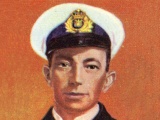313 Roman emperor Licinius unified the entire Eastern Roman Empire under his rule.
1006 Supernova SN 1006, the brightest supernova in recorded history, appeared in the constellation Lupus.
1315 Enguerrand de Marigny was hanged on the public gallows at Montfaucon.
1492 Spain gave Christopher Columbus his commission of exploration.
1513 Edmund de la Pole, Yorkist pretender to the English throne, was executed on the orders of Henry VIII.
1651 Jean-Baptiste de la Salle, French educational reformer, Catholic saint, was born (d. 1719).
1671 Petar Zrinski, the Croatian Ban from the Zrinski family, was executed.
1789 George Washington took the oath of office to become the first elected President of the United States.
1794 The Battle of Boulou was fought, in which French forces defeated the Spanish under General Union.
1803 Louisiana Purchase: The United States purchased the Louisiana Territory from France for $15 million, more than doubling the size of the young nation.
1838 Nicaragua declared independence from the Central American Federation.
1864 Pai Marire warriors were defeated at Sentry Hill.

1865 ex-Governor Robert Fitzroy committed suicide.

1871 The Camp Grant Massacre took place in Arizona Territory.
1894 Coxey’s Army reached Washington, D.C. to protest the unemployment caused by the Panic of 1893.
1900 Hawaii became a territory of the United States, with Sanford B. Doleas governor.
1900 Casey Jones died in a train wreck in Vaughn, Mississippi, while trying to make up time on the Cannonball Express.
1904 The Louisiana Purchase Exposition World’s Fair opened in St. Louis, Missouri.
1907 Honolulu, Hawaii became an independent city.
1909 Queen Juliana of the Netherlands, was born (d. 2004).
1917 – Lieutenant-Commander William Sanders was awarded the Victoria Cross for his bravery when the Q-ship he commanded was attacked by a German U-boat.

1925 Dodge Brothers, Inc was sold to Dillon, Read & Company for $146 million plus $50 million for charity.
1927 The Federal Industrial Institute for Women, opened in Alderson, West Virginia, as the first women’s federal prison in the United States.
1927 – Douglas Fairbanks and Mary Pickford became the first celebrities to leave their footprints in concrete at Grauman’s Chinese Theater in Hollywood.
1933 Willie Nelson, American musician, was born.
1937 The Philippines held a plebiscite for Filipino women on whether they should be extended the right to suffrage; more than 90% voted in the affirmative.
1938 The animated cartoon short Porky’s Hare Hunt debuted in movie theatres, introducing Happy Rabbit.
1938 The first televised FA Cup Final took place between Huddersfield Town and Preston North End.
1939 The 1939-40 New York World’s Fair opened
1939 NBC inaugurated its regularly scheduled television service in New York City, broadcasting President Franklin D. Roosevelt’s World’s Fair opening day ceremonial address.
1943 World War II: Operation Mincemeat: The submarine HMS Seraphsurfaced in the Mediterranean Sea off the coast of Spain to deposit a dead man planted with false invasion plans and dressed as a British military intelligence officer.
1945 World War II: Fuehrerbunker: Adolf Hitler and Eva Braun committed suicide after being married for one day. Soviet soldiers raised the Victory Banner over the Reichstag building.
1946 King Carl XVI Gustaf of Sweden, was born.
1947 The Boulder Dam was renamed Hoover Dam a second time.
1948 The Organization of American States was established.
1949 António Guterres, former Prime Minister of Portugal, was born.
1953 In Warner Robins, Georgia, an F4 tornado killed 18 people.
1953 Merrill Osmond, American musician (The Osmonds), was born.
1954 Jane Campion, New Zealand film director, was born.
1956 Former Vice President and Senator Alben Barkley died during a speech in Virginia. He collapsed after proclaiming “I would rather be a servant in the house of the lord than sit in the seats of the mighty.”
1959 Stephen Harper, Prime Minister of Canada, was born.
1973 Watergate Scandal: U.S. President Richard Nixon announced that top White House aids H.R. Haldeman, John Ehrlichman and others had resigned.
1975 Fall of Saigon: Communist forces gained control of Saigon. The Vietnam War formally ended with the unconditional surrender of South Vietnamese president Duong Van Minh.
1980 Accession of Queen Beatrix of the Netherlands.
1988 Queen Elizabeth II officially opened World Expo ’88 in Brisbane, Australia.
1993 CERN announced World Wide Web protocols would be free.
1993 Virgin Radio broadcast for the first time in the United Kingdom.
1995 U.S. President Bill Clinton became the first President to visit Northern Ireland.
1999 Cambodia joined the Association of Southeast Asian Nations (ASEAN)bringing the number of members to 10.
2004 U.S. media release graphic photos of American soldiers abusing and sexually humiliating Iraqi prisoners at Abu Ghraib prison.
2008 Two skeletal remains found near Ekaterinburg, Russia were confirmed by Russian scientists to be the remains of Alexei Nikolaevich, Tsarevich of Russia and one of his sisters Grand Duchess Anastasia Nikolaevna.
2009 Chrysler filed for Chapter 11 bankruptcy.
2009 – Seven people were killed and 17 injured at a Queen’s Day parade in Apeldoorn, Netherlands in an attempted assassination on Queen Beatrix.
2010 – Hailed as the largest World’s Fair in history, Expo 2010 opened in Shangai.
2013 – A powerful explosion occurred in an office building in Prague, Czech Republic, believed to have been caused by natural gas, injures 43 people.
2014 – A bomb blast in Ürümqi kiled three people and injured 79 others.
Sourced from NZ History Online & Wikipedia



 Posted by homepaddock
Posted by homepaddock 



